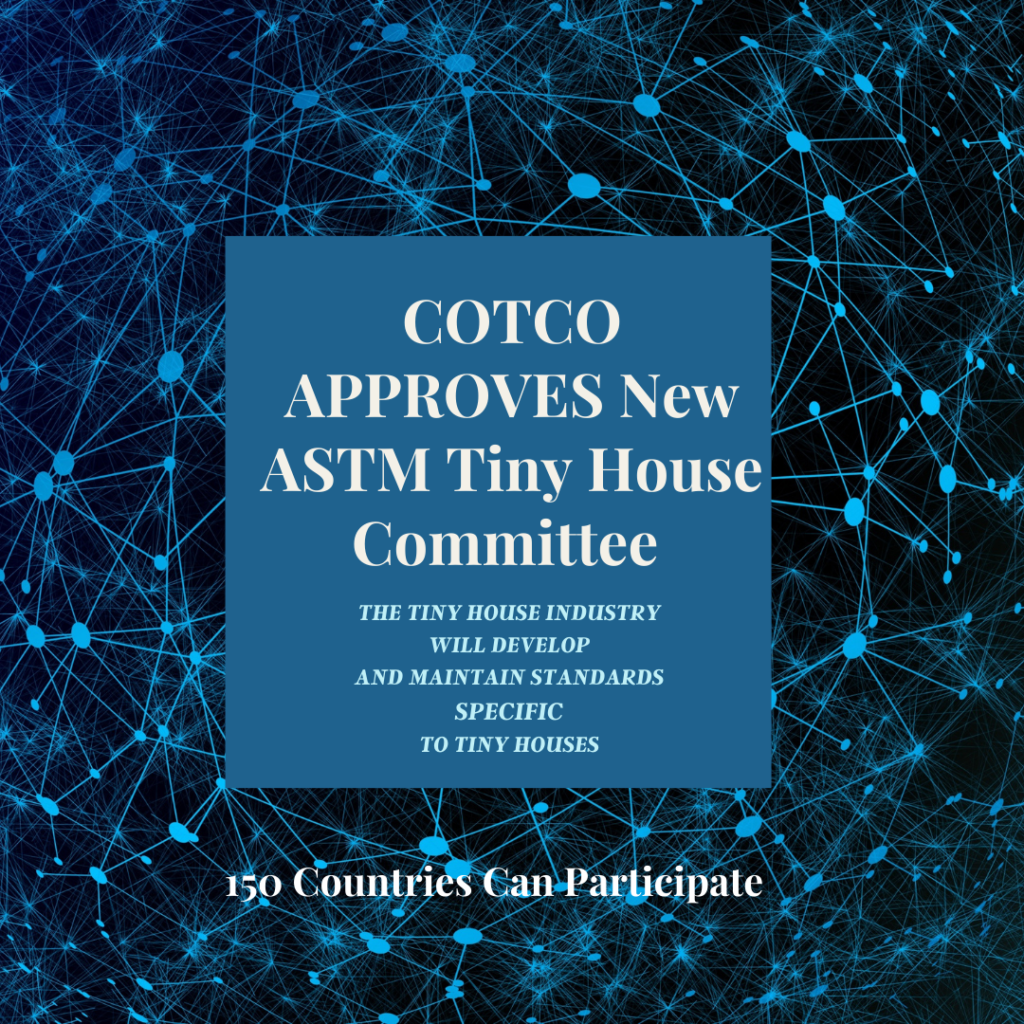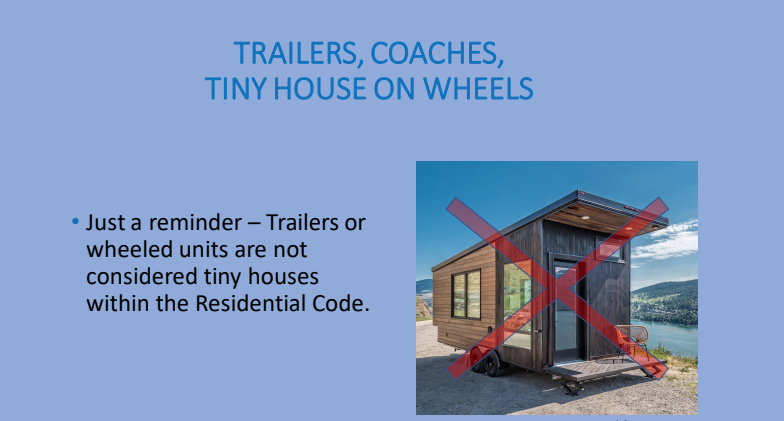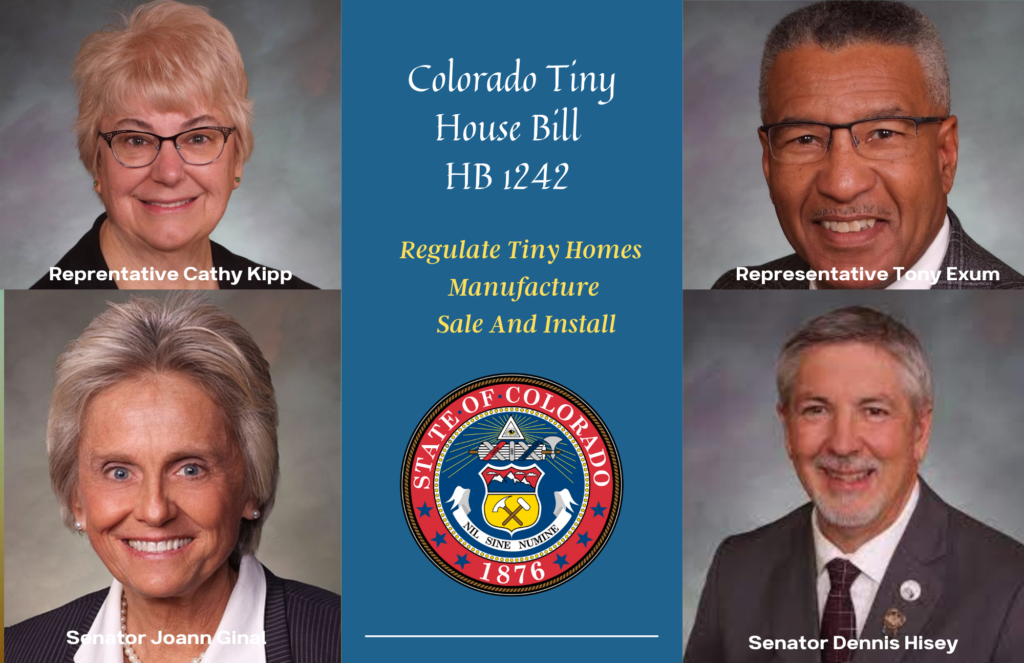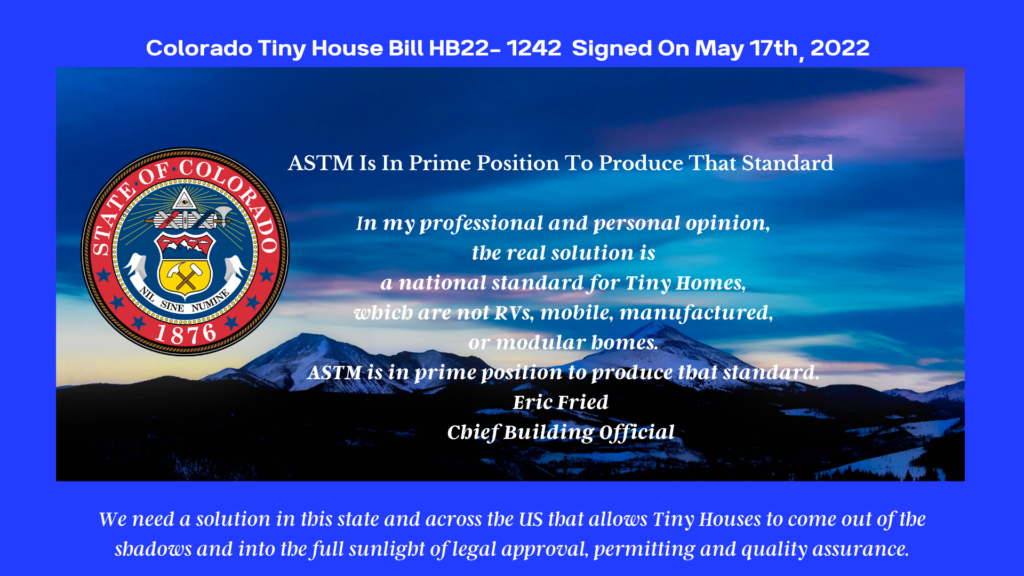HB22-1242 Signed May 17th, 2022
Colorado Tiny House Bill HB22-1242 passed the senate and was signed on May 17th, 2022. This bill expands the authority of the State Board of Housing (board) in the Department of Local Affairs (DOLA) to promulgate rules establishing standards for tiny homes that cover the manufacture,assembly, and installation of tiny homes; and uniform foundation construction standards for factory–built structures or tiny homes in areas of the state where no standards exist. The rules must
be promulgated by July 1, 2023.
ASTM International Is Listed As A Potential Standard
(2) Rules promulgated by the board must include provisions
imposing requirements reasonably consistent with recognized and accepted
standards adopted by THE ASTM INTERNATIONAL, the International Code
Council, the National Fire Protection Association, and the Colorado state
plumbing and electrical codes, or a combination thereof OF THESE
STANDARDS AND CODES, except to the extent that the board finds that the
standards and codes are inconsistent with this part 33. All iu cs promulgated
by The board must be adopted SHALL ADOPT RULES pursuant to article 4 of
this title 24.PAGE 8-HOUSE BILL 22-1242

Eric Fried, Larimer County Cheif Building Official Details How The Tiny House Bill Came About
Because Larimer County residents kept coming to me, other county staff and elected leaders asking how they could legally live on acreage in their Tiny Home, and we kept having to tell them there is no way to do so under existing state law, I worked with State Representative Cathy Kipp, the Colorado Division of Housing, and held numerous stakeholder meetings as we developed a bill to address the issue. As they saw the opportunity to legalize Tiny Houses on Wheels and give a boost to the industry, almost all Tiny Home groups in Colorado and beyond jumped enthusiastically on board.

Why The IRC Does Not Address All Requirements For Tiny Houses On Wheels
Some may argue that no ASTM standard is needed or that ICC’s International Residential Code (IRC) should be THE standard for Tiny Houses. Nothing could be further from the truth. As you no doubt know, the IRC’s prescriptive standards for footings and foundations have no place for Tiny Houses on Wheels and only apply to wood, masonry, and concrete foundations with footings placed below the frost depth of the locality. IRC voluntary Appendix Q for Tiny Houses does not address structural concerns such as footings, foundations or framing at all, only ceiling height, lofts, stairs, egress windows and energy efficiency. With no IRC rules, each Tiny Houses on Wheels would need an engineered foundation system and/or its wheels removed and placed on a conventional foundation.
Most Tiny Homes do not fit this limited model. Most Tiny Home owners want the potential mobility associated with a home on wheels, while being able to live for more than 30 days outside of an RV park. A purported solution that excludes 95% of the subject is obviously no solution at all. We need a solution in this state and across the US that allows Tiny Houses to come out of the shadows and into the full sunlight of legal approval, permitting and quality assurance.
There is a ticking clock here. HB22-1242 mandates the Division of Housing to adopt a standard appropriate to Tiny Homes by July 1, 2023. If ASTM does not develop its standard, or even if the ASTM standard is sufficiently delayed, the Division of Housing may have no option but to adopt the IRC with Appendix Q as the default standard. I administer the IRC every day. It is a fine code – but it does not remotely fit Tiny Houses on Wheels, a crucial part of the solution to our growing national housing affordability crisis.
In my professional and personal opinion, the real solution is a national standard for Tiny Homes, which are not RVs, mobile, manufactured, or modular homes. ASTM is in prime position to produce that standard. Please do not be dissuaded by incorrect information or questionable lobbying tactics by proprietary groups with conflicts of interest.
Eric Fried
Chief Building Official
Larimer County, Colorado
Summary Of Legislation

Special Thanks To The Legislators
That Initiated The Colorado Tiny House Bill HB22-1242
The sponsors were Representatives Cathy Kipp, Tony Exum, and Senators Joann Ginal, and Dennis Hisey. Tiny House Alliance USA and all interested stakeholders were welcomed on two calls and we continued our conversations with the building officials who allowed our voices to contribute to this very important legislation that could be a template for the nation.
Special thanks to Eric Fried, Larimer Colorado Chief Building Official and to Maulid ( Mo) Miskell, Interim Deputy Director, Colorado Division Of Housing, Office Of Regulatory Oversight, Building Codes and Standards who crafted the direction of the bill and for letting us participate in discussions, allowing our input, and spending time answering our questions.

